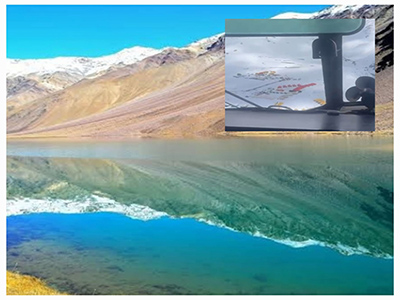Himachal High Court Steps Up Wetland Protection Efforts...High Court Silent on whether camping and orher tourism activities near the wetland can be carried out?
Shimla – In a major move to safeguard its wetlands, the Himachal Pradesh High Court is doubling down on conservation efforts following a directive from the Supreme Court.
This action aims to protect vital ecosystems like Renuka, Chander Taal, and Pong Dam, all of which are recognized under the Ramsar Convention.
It all started with a Suo Motu writ petition by the Supreme Court. On April 3, 2017, in the case of M.K. Balakrishnan & others vs. Union of India & others, the Supreme Court underscored the significance of these wetlands and urged High Courts to oversee their management to ensure visible improvements.
In response, the Himachal Pradesh High Court appointed Shri Deven Khanna as Amicus Curiae to assist with the case. The court’s firm oversight led to the creation of the Himachal State Wetlands Authority on November 7, 2017, under the Wetlands (Conservation and Management) Rules, 2017.
Since then, the court has been issuing orders to ensure the state government complies with conservation norms and submits regular status reports.
Monitoring and Compliance
The Wetlands Authority has conducted detailed inspections of key wetlands, including Renukaji, Rewalsar, Pong Dam, Khajiar, and Chandertal.
Their findings have been essential in shaping the state's conservation strategy.
The High Court also reconstituted the State Level Steering Committee and required audits by an Expert Committee to ensure compliance with conservation efforts.
Additionally, the court has demanded a detailed response from the Union Government on budget allocations for these initiatives.
Latest Developments
In its latest directive, the High Court has instructed the State Government to file a status report by July 1, 2024, as per Rule 4 of the Wetlands Rules, 2010. This report must detail compliance with various prohibitions and restrictions aimed at preventing ecological damage.
Main Prohibitions Include:
- No reclaiming of wetlands.
- No setting up or expanding industries.
- No handling hazardous substances.
- No solid waste dumping.
- No discharging untreated waste and effluents.
- No permanent construction within 50 meters of the wetland.
- No activities that adversely impact the wetland ecosystem.
Restricted Activities Requiring Approval:
- Withdrawing or diverting water.
- Harvesting resources.
- Grazing at sustainable levels.
- Discharging treated effluents within limits.
- Motorized boating, if not harmful.
- Dredging due to siltation.
- Building boat jetties.
- Activities affecting the ecological character.
- Temporary facilities like pontoon bridges.
- Aquaculture, agriculture, and horticulture.
- Repairing existing infrastructure.
- Any other activities identified by the Authority.
Environmental Impact Assessment (EIA):
The State Government must ensure detailed EIAs are conducted for activities affecting the wetlands, as per the 2006 notification by the Ministry of Environment and Forests.
Conversion to Non-Wetland Use:
No wetland can be converted to non-wetland use without Central Government approval, justified by public interest, and backed by detailed reasons.
What’s Next?
The upcoming status report will be crucial in evaluating the progress and effectiveness of these conservation efforts.
But the High Court has not specified whether or not tourism activities like camping and swimming and bathing in the wetlands are allowed or not.
These activities are carried out in Chandertal, Renuka and Pong dam.
The High Court's vigilant oversight is a step towards ensuring Himachal Pradesh's wetlands remain protected, preserving these vital ecosystems for future generations.
This report will give a clearer picture of the on-ground realities and the impact of the conservation measures implemented so far.




